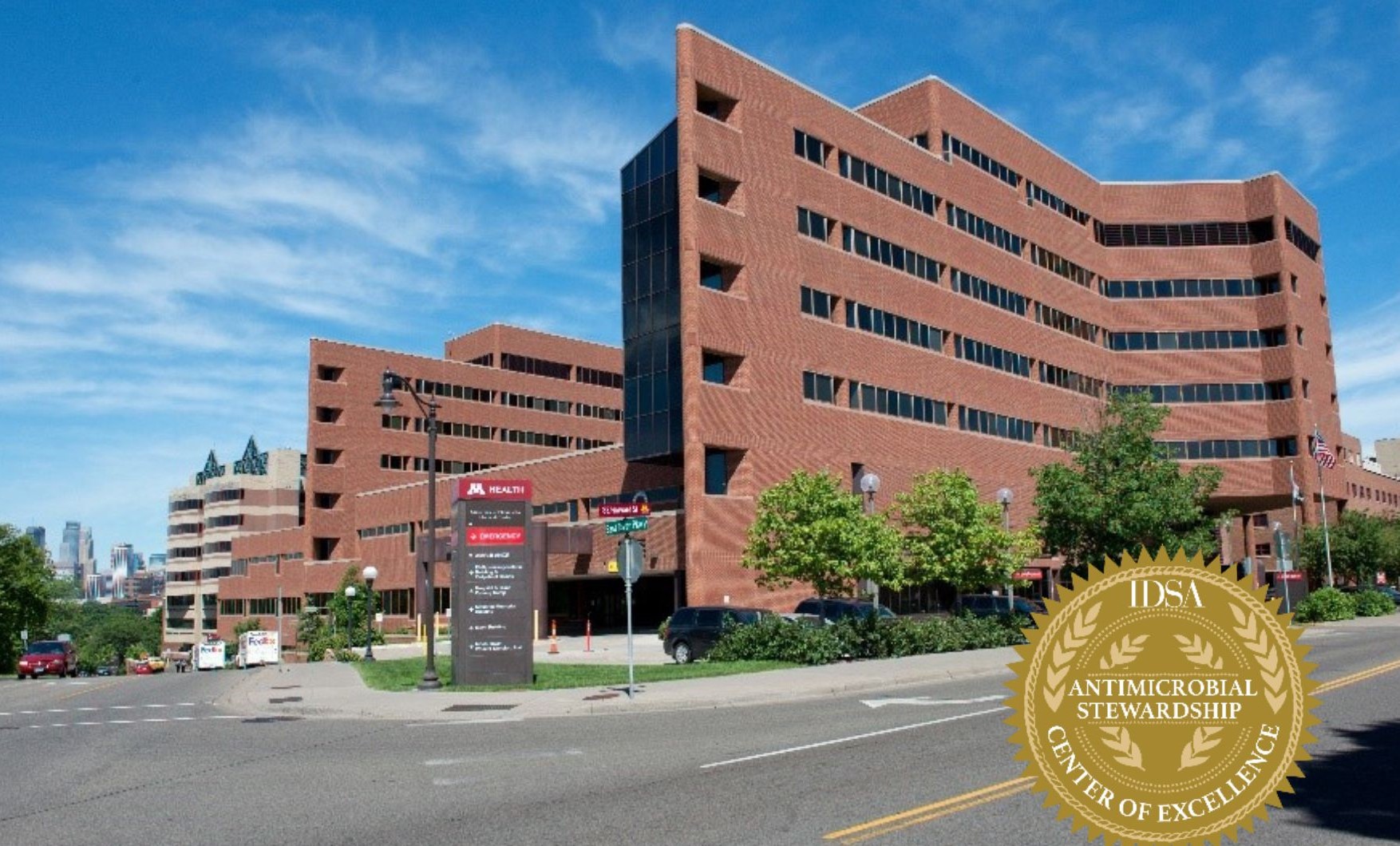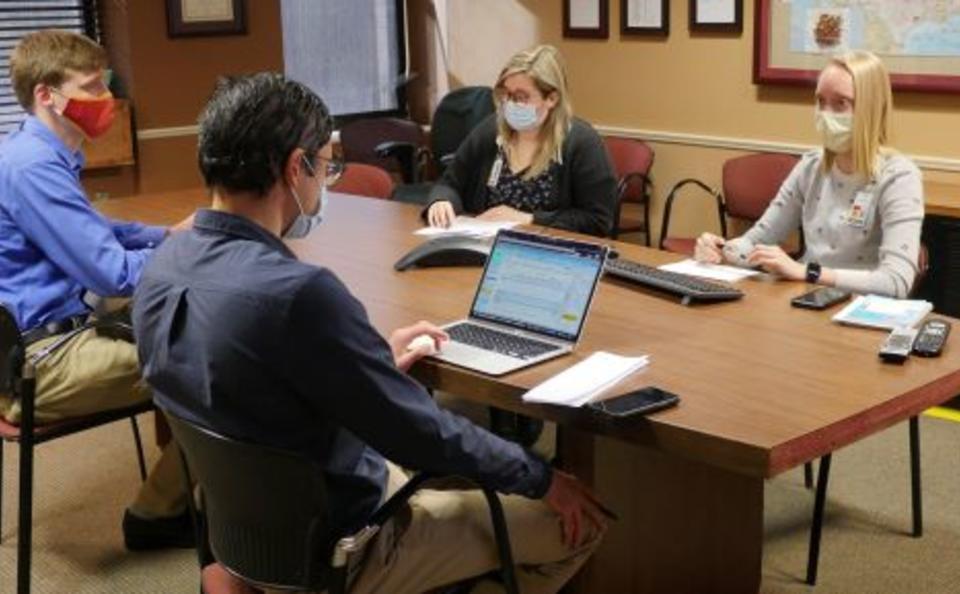Antimicrobial Stewardship

University of Minnesota Medical Center Antimicrobial Stewardship Center of Excellence
The Infectious Diseases Society of America (ISDA) has honored the University of Minnesota Medical Center (UMMC) as an Antimicrobial Stewardship Center of Excellence. Following seven core Elements of Hospital Antibiotic Stewardship, UMMC has demonstrated excellence in antibiotic stewardship in the hospital setting and provides a gold standard of care in combating antimicrobial resistance.
Antimicrobial East
Antimicrobial Stewardship Program (ASP) at UMMC-East Bank was established in 2007. The antimicrobial stewardship team (AST) is an interdisciplinary team consisting of ID provider, clinical ID pharmacists, PGY2 ID pharmacy residents, PGY1 pharmacy residents, and pharmacy students. Daily activities include chart review of all patients started on restricted antimicrobials to determine appropriateness of therapy based on supportive, institutional, and national guidelines. Patients are selected for formal discussion at interdisciplinary stewardship rounds. Recommendations are documented in the patient’s electronic medical record as progress notes and communicated to the primary medical teams. AST performs penicillin and cephalosporin allergy assessment and determines need for penicillin skin testing. In collaboration with the microbiology lab, AST pharmacists receive pages throughout the day for all gram-negative bacteremia to ensure rapid de-escalation and timely targeted therapy. We also serve as a resource for pharmacy and medical staff while on-call. Finally, AST collaborates with Infection Prevention, nursing, and medical teams on projects to optimize antimicrobial utilization and reduce antimicrobial resistance. We track our restricted antimicrobial days of therapy (DOTs) and report our antimicrobial utilization (AU) through the CDC’s National Healthcare Safety Network (NHSN) to monitor utilize and identify opportunities to improve overall utilization.
AMT East current projects:
- We are currently expanding stewardship’s reach by rolling out a multidisciplinary pilot project of antibiotic time-out at 48–72 hours to prompt clinicians to re-evaluate antibiotic appropriateness including the need for de-escalation and discontinuation.
- Evaluation and validation of vancomycin Area Under the Curve (AUC) dosing and monitoring in select patient population including CNS infections and those patients receiving renal replacement therapy.
Recent projects:
- Creation of an ED specific UTI antibiogram and empiric treatment algorithm.
- Implementation of a pre-operative Penicillin/Cephalosporin Allergy Assessment in the surgical population.
Antimicrobial West- Expansion
West Bank Expansion Antimicrobial Stewardship Team (AST) is a new addition to the robust, longstanding East Bank AST service, that started in August 2020. This co-led ID provider and ID PharmD service covers antimicrobial stewardship for West Bank-UMMC (adults), Northland, and Lakes. Unique to Northland and Lakes is a tele-antimicrobial stewardship component where daily AST coordination and conversation is had with pharmacists and hospitalists. The AST ID provider may provide additional care via the ID Curbside Line. Outside of daily restricted antimicrobial evaluation, we have been tracking each site’s AST intervention acceptance rates, which have steadily increased to above 80% over the last year. In addition, we reviewed all hospital-onset and healthcare facility-associated C. difficile cases with Infection Prevention and presented our findings to the hospitalist teams. Looking ahead, we are excited to roll out a tele-antimicrobial stewardship dashboard with key metrics to allow for further guidance on targeted stewardship initiatives and continued collaboration with the Lakes Emergency Department to target empiric antibiotic prescribing practices for common infections in patients who require hospital admission.
Antimicrobial Pediatrics
The pediatric antimicrobial stewardship team uses prospective audit with feedback to prescribers and incorporates handshake stewardship into their daily rounding. The team also partners with providers to create local clinical practice guidance to optimize antimicrobial use. In collaboration with the neonatology division, antimicrobial stewardship efforts led to a decrease in vancomycin use by 47% and meropenem use by 80% in the NICU within the first 3 years of starting the pediatric antimicrobial stewardship program.
The team recently worked to create an antibiogram-guided urinary tract infection guidance document for the pediatric emergency department to improve antimicrobial prescribing for pediatric urinary tract infections. They also created a pediatric penicillin allergy team which performs allergy assessments on patients with a labeled penicillin and/or cephalosporin allergy at M Health Fairview Masonic Children’s Hospital. The team looks forward to expanding this program to include inpatient allergy testing soon.
See link below for their recent publication of this work in the Journal of Pediatric Pharmacology and Therapeutics: Louden NJ, et al. J Pediatr Pharmacol Ther. 2021;26(7):696-701.

Adult ASP Lead
Susan Kline, MD, MPH
Professor of Medicine

Pediatrics ASP Lead
Laura Norton, MD
Associate Professor of Pediatrics

Pediatrics ASP Lead
Meredith Oliver

